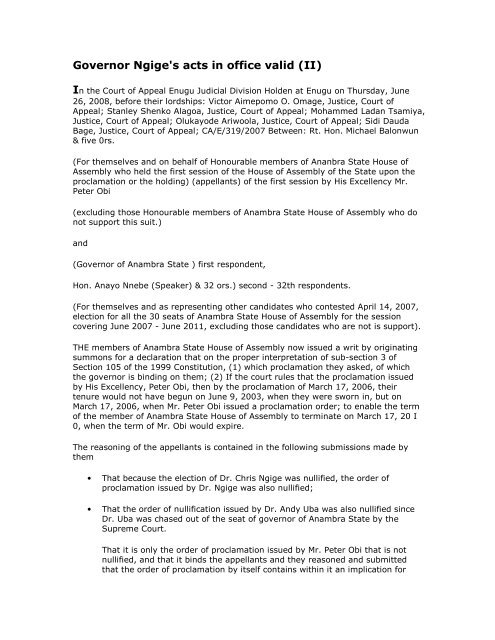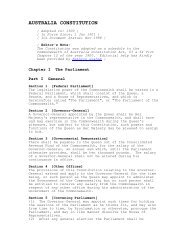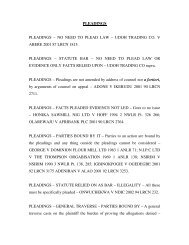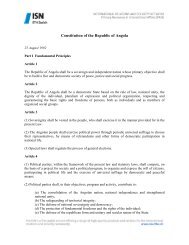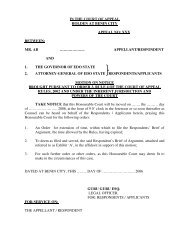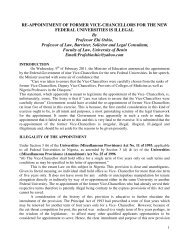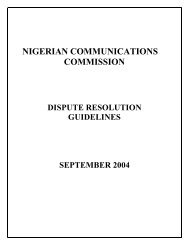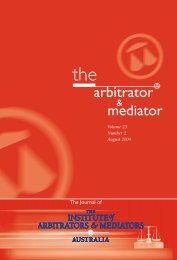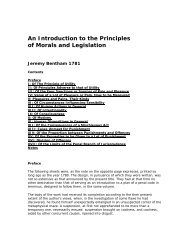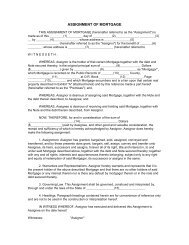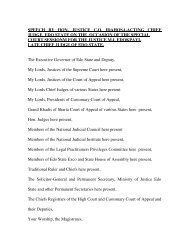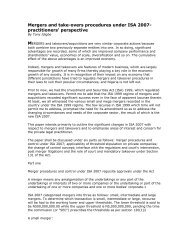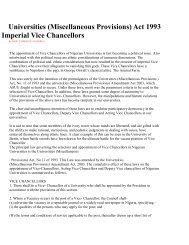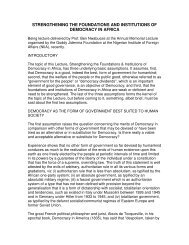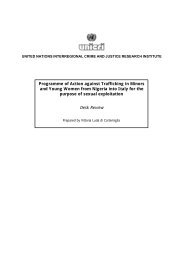Governor Ngige's acts in office valid (II) - Nigerian Law Guru
Governor Ngige's acts in office valid (II) - Nigerian Law Guru
Governor Ngige's acts in office valid (II) - Nigerian Law Guru
Create successful ePaper yourself
Turn your PDF publications into a flip-book with our unique Google optimized e-Paper software.
<strong>Governor</strong> <strong>Ngige's</strong> <strong>acts</strong> <strong>in</strong> <strong>office</strong> <strong>valid</strong> (<strong>II</strong>)<br />
In the Court of Appeal Enugu Judicial Division Holden at Enugu on Thursday, June<br />
26, 2008, before their lordships: Victor Aimepomo O. Omage, Justice, Court of<br />
Appeal; Stanley Shenko Alagoa, Justice, Court of Appeal; Mohammed Ladan Tsamiya,<br />
Justice, Court of Appeal; Olukayode Ariwoola, Justice, Court of Appeal; Sidi Dauda<br />
Bage, Justice, Court of Appeal; CA/E/319/2007 Between: Rt. Hon. Michael Balonwun<br />
& five 0rs.<br />
(For themselves and on behalf of Honourable members of Ananbra State House of<br />
Assembly who held the first session of the House of Assembly of the State upon the<br />
proclamation or the hold<strong>in</strong>g) (appellants) of the first session by His Excellency Mr.<br />
Peter Obi<br />
(exclud<strong>in</strong>g those Honourable members of Anambra State House of Assembly who do<br />
not support this suit.)<br />
and<br />
(<strong>Governor</strong> of Anambra State ) first respondent,<br />
Hon. Anayo Nnebe (Speaker) & 32 ors.) second - 32th respondents.<br />
(For themselves and as represent<strong>in</strong>g other candidates who contested April 14, 2007,<br />
election for all the 30 seats of Anambra State House of Assembly for the session<br />
cover<strong>in</strong>g June 2007 - June 2011, exclud<strong>in</strong>g those candidates who are not is support).<br />
THE members of Anambra State House of Assembly now issued a writ by orig<strong>in</strong>at<strong>in</strong>g<br />
summons for a declaration that on the proper <strong>in</strong>terpretation of sub-section 3 of<br />
Section 105 of the 1999 Constitution, (1) which proclamation they asked, of which<br />
the governor is b<strong>in</strong>d<strong>in</strong>g on them; (2) If the court rules that the proclamation issued<br />
by His Excellency, Peter Obi, then by the proclamation of March 17, 2006, their<br />
tenure would not have begun on June 9, 2003, when they were sworn <strong>in</strong>, but on<br />
March 17, 2006, when Mr. Peter Obi issued a proclamation order; to enable the term<br />
of the member of Anambra State House of Assembly to term<strong>in</strong>ate on March 17, 20 I<br />
0, when the term of Mr. Obi would expire.<br />
The reason<strong>in</strong>g of the appellants is conta<strong>in</strong>ed <strong>in</strong> the follow<strong>in</strong>g submissions made by<br />
them<br />
• That because the election of Dr. Chris Ngige was nullified, the order of<br />
proclamation issued by Dr. Ngige was also nullified;<br />
• That the order of nullification issued by Dr. Andy Uba was also nullified s<strong>in</strong>ce<br />
Dr. Uba was chased out of the seat of governor of Anambra State by the<br />
Supreme Court.<br />
That it is only the order of proclamation issued by Mr. Peter Obi that is not<br />
nullified, and that it b<strong>in</strong>ds the appellants and they reasoned and submitted<br />
that the order of proclamation by itself conta<strong>in</strong>s with<strong>in</strong> it an implication for
extension of tenure of the period of the membership of Anambra State House<br />
of Assembly. My Lords, an order of proclamation does not conta<strong>in</strong> such<br />
benefit to the <strong>in</strong>crease of the duration of the House, s<strong>in</strong>ce to imply so is to<br />
defeat the clear provisions of sub-section (1) of Section 105 of the 1999<br />
Constitution, which is a peremptory order for the determ<strong>in</strong>ation of the life of<br />
the membership of the Anambra State House of Assembly.<br />
The comments of the trial court, however, founded which is not conta<strong>in</strong>ed <strong>in</strong><br />
the basis of the judgment and decision of the court below is a mere<br />
observation and cannot form a ground of appeal.<br />
The trial court is not a litigant <strong>in</strong> the pend<strong>in</strong>g case and the statement is not a<br />
subject of contest <strong>in</strong> the court, which is argued by the counsel <strong>in</strong> the court<br />
below. Ground three and the issue formulated on it is <strong>in</strong>competent, it is struck<br />
out of the proceed<strong>in</strong>gs.<br />
My lords, I will now deal with issues one, two and four <strong>in</strong> the appellants' brief<br />
to which the respondents have filed brief <strong>in</strong> absolute apposition to the<br />
arguments of the appellants. I wish to commence the treatment of this<br />
segment of the appeal by express<strong>in</strong>g the op<strong>in</strong>ion of this court as conta<strong>in</strong>ed <strong>in</strong><br />
my judgment on the issue four <strong>in</strong> the appellants brief to which the second to<br />
30 respondents also responded <strong>in</strong> the brief of Arthur Obi Okafor for the<br />
respondent. The question is whether the lower court erred <strong>in</strong> law <strong>in</strong> wrongly<br />
<strong>in</strong>terpret<strong>in</strong>g the phrase "shall have power", among others.<br />
The trial court had ruled <strong>in</strong> his judgment before the court that the phrase<br />
"shall have power" merely <strong>in</strong>form the donee of the power his ability <strong>in</strong> relation<br />
to the issue <strong>in</strong> contest and under Section 10 of the Interpretation Act, the<br />
powers is exercisable as and when due or necessary.<br />
The phrase is not mandatory. The respondents counsel <strong>in</strong> the submission <strong>in</strong><br />
his brief agrees with such def<strong>in</strong>ition. It is, therefore, correct to cite <strong>in</strong> support<br />
of the submission as authority the decision of the court as <strong>in</strong> Umar v.<br />
<strong>Governor</strong> of Kaduna State & Ors. Reported (1981) 2 NCL 689. The word<br />
"shall' used without more may be one or all of these mandatory directives, or<br />
persuasive. It would depend on the circumstance <strong>in</strong> which it is used. See<br />
Ishola v. Ajiboye (1994) 7 - 8 SCNJ per Iguh JSC. For <strong>in</strong>stance, <strong>in</strong> the 1979<br />
Constitution, it was ruled by the Supreme Court that Section 238 thereon was<br />
used not <strong>in</strong> a mandatory or directory manner, but <strong>in</strong> a persuasive sense. See<br />
Karto v. Central Bank (1991) 12 SCNJ. In sub-section (1) of Section 105 of<br />
the 1999 Constitution which subscribe thus: "A House of Assembly shall stand<br />
dissolved "at the expiration of four years", among others. The word shall<br />
there<strong>in</strong> used is mandatory. It allows for no alternative. The various Houses of<br />
Assembly <strong>in</strong> Nigeria shall necessarily stand dissolved when four years have<br />
been concluded and their tenure ends. What is left uncerta<strong>in</strong> is the date of the<br />
first sitt<strong>in</strong>g of the House. However, when <strong>in</strong> sub-section 3 of Section 105 of<br />
the 1999 Constitution subscribes thus: subject to the provisions of this<br />
Constitution, the governor of a state shall have power to issue a proclamation<br />
for the hold<strong>in</strong>g of the 1st session of the House of Assembly of the state House<br />
concerned immediately after his be<strong>in</strong>g sworn <strong>in</strong> for its dissolution", among<br />
others. The phrase "shall have power" there<strong>in</strong> used is only to <strong>in</strong>form the<br />
elected governor of the power he possess as a governor, an attribute of his
gubernatorial power and position. There is no compulsion to use the power<br />
other than as it is necessary. The word shall there<strong>in</strong> used is not compulsory;<br />
it is only directory when it needs to be used.<br />
In an ideal situation, the membership of the House of Assembly would not<br />
have had any sitt<strong>in</strong>g at the time a governor takes his own oath of <strong>office</strong>. The<br />
House of Assembly may have congregated <strong>in</strong> the House and await the tak<strong>in</strong>g<br />
of oath of the governor. Section 105(3) would then be properly applied and<br />
the governor may now make a proclamation of the first sitt<strong>in</strong>g of the House of<br />
Assembly now <strong>in</strong>augurated by the proclamation of the governor.<br />
My lords, <strong>in</strong> my view, once such a proclamation has been made by a governor<br />
to br<strong>in</strong>g <strong>in</strong>to life first sitt<strong>in</strong>g of House of Assembly, the relevant House of<br />
Assembly has begun, there would be no need for further proclamation for<br />
another first sitt<strong>in</strong>g; as the sitt<strong>in</strong>g of the House has already commenced.<br />
The situation advocated by the appellant of hav<strong>in</strong>g another first sitt<strong>in</strong>g after<br />
the House of Assembly of Anambra State had been sitt<strong>in</strong>g for over two years<br />
makes a ridicule of the respected procedure <strong>in</strong> an Honourable House. It is not<br />
feasible. All the House needs to do is to disable the rul<strong>in</strong>g governor. Then, the<br />
House will have an endless session when a new governor is unable to<br />
proclaim a new fresh session.<br />
The word proclamation there<strong>in</strong> simply announces the first assemblage of the<br />
House of Assembly; not otherwise, it is not <strong>in</strong>tended for use, when the House<br />
had previously been proclaimed by a governor.<br />
For the several reasons stated above, the appellant is <strong>in</strong> error and<br />
misconceived the purport and mean<strong>in</strong>g of the phrase 'shall have power' when<br />
the counsel submitted that the phrase is directory, it is not.<br />
I resolve the issue aga<strong>in</strong>st the appellant. Issues one and two <strong>in</strong> the<br />
appellants' brief ask whether the lower court gave proper <strong>in</strong>terpretation to the<br />
provisions of Section 105(3) of the 1999 Constitution, on whether the action<br />
of Dr. Ngige and Dr. Andy Uba are saved <strong>in</strong> law.<br />
The objective of the two questions conta<strong>in</strong>ed <strong>in</strong> the issues of the appellant is<br />
to create opportunity for the appellant to justify his submissions, that it is the<br />
second com<strong>in</strong>g of His Excellency, Mr. Peter Obi, which <strong>in</strong>itiated the<br />
commencement of sitt<strong>in</strong>g of the Anambra State House of Assembly.<br />
The respondents have denied this and submitted that at most, assum<strong>in</strong>g that<br />
the tenure not the election of Dr. Uba, and Dr. Ngige are called <strong>in</strong> question by<br />
a nullification by the Court of Appeal, the action taken by the two governors<br />
rema<strong>in</strong> effective <strong>in</strong> law, that the actions of the two governors at different<br />
times are saved by the doctr<strong>in</strong>e of regularity and are de facto effective s<strong>in</strong>ce<br />
the said Dr. Ngige and Dr. A. Uba were, <strong>in</strong> fact, before the annulment of their<br />
election regarded as de jure governors. If not so, at least, de facto by virtue<br />
of the fact that the two were sworn <strong>in</strong> as governors.
This is also the decision of the court below with which the appellant was<br />
dissatisfied. In this appeal on this issue, Dr. Chris Ngige was returned as the<br />
lawful governor of Anambra State at the time before the court's decision<br />
nullified his election follow<strong>in</strong>g the f<strong>in</strong>d<strong>in</strong>gs of the governorship election<br />
tribunal.<br />
<strong>Governor</strong> Ngige took on his <strong>in</strong>itial election, an oath of <strong>office</strong> which Mr. Obi<br />
took. <strong>Governor</strong> Ngige exercised for two years all the functions of a governor.<br />
Noth<strong>in</strong>g <strong>in</strong> law has nullified those actions, though his election has been<br />
nullified. All the <strong>acts</strong> performance by him <strong>in</strong> that period as governor were<br />
legally performed. The nullification of his election has made him to cease the<br />
performance of those functions as a governor, the actions made by him at a<br />
time before his nullification rema<strong>in</strong>s <strong>valid</strong> and enforceable at law. To hold<br />
otherwise will engender chaos.<br />
The various and several legislations made by the House of Assembly which<br />
were assented to by the governor as an issue from the House of Assembly<br />
rema<strong>in</strong> <strong>valid</strong>, legal and b<strong>in</strong>d<strong>in</strong>g and are not set aside or rendered null and<br />
void.<br />
The reasons are many; the laws were not made by Dr. Ngige alone. In<br />
accordance with parliamentary practice, many of the legislations affect<strong>in</strong>g<br />
Anambra State orig<strong>in</strong>ated from the Anambra State House of Assembly. No<br />
matter what procedure was used <strong>in</strong> Anambra State, the legislations orig<strong>in</strong>ated<br />
from the House <strong>in</strong> Anambra State, the governor merely assented to each of<br />
them to make it law. There are also various appo<strong>in</strong>tments made <strong>in</strong> the over<br />
two years spent when Dr. Ngige was governor. All these rema<strong>in</strong> legally made<br />
and b<strong>in</strong>d<strong>in</strong>g, though the governor has ceased to be one. The same pr<strong>in</strong>ciple<br />
applies <strong>in</strong> the case of Dr. Andy Ubah. The respondents' brief shows that Dr.<br />
Ngige made an order for proclamation of the House of Assembly after he took<br />
his oath of <strong>office</strong>, the proclamation created the commencement of the first<br />
sitt<strong>in</strong>g of the Anambra State House of Assembly. Thereafter, <strong>Governor</strong> Ngige<br />
made the Appropriation <strong>Law</strong>, which rema<strong>in</strong> <strong>in</strong> force and enabled the public<br />
servants of Anambra State to be paid their salaries. These legislations are still<br />
<strong>in</strong> operation <strong>in</strong> Anambra State, it leaves little to imag<strong>in</strong>ation why the former<br />
members of the House of Assembly are say<strong>in</strong>g and submitt<strong>in</strong>g that only the<br />
proclamation made by Dr. Ngige as governor is null and void.<br />
The proclamation order issued at the commencement of his tenure by Dr.<br />
Ngige for the first sitt<strong>in</strong>g of the House is <strong>valid</strong>; and the subsequent order<br />
issued by Mr. Peter Obi is needless, because the member of House of<br />
Assembly was already sitt<strong>in</strong>g.<br />
A new proclamation made by Mr. Peter Obi to the House does not at all affect<br />
the tenure of Anambra State House of Assembly, which should term<strong>in</strong>ate at<br />
the expiration of four years from the date of its first sitt<strong>in</strong>g <strong>in</strong> 2003.<br />
The enlargement of time given by the Supreme Court to Mr. Peter Obi <strong>in</strong><br />
(2007) <strong>II</strong> NWLR 654 as specifically stated applies to Mr. Peter Obi alone. The<br />
judgment expressed it <strong>in</strong> these words "for the avoidance of doubt, this<br />
judgment relates only to the Office of the <strong>Governor</strong> of Anambra State".
I have arrived at the conclusions above because I have read the decision <strong>in</strong><br />
Ngige v. Obi. I have seen nowhere there<strong>in</strong> where the tenure of Dr. Ngige as<br />
governor was declared null and void; the decision only concerns the<br />
nullification of the election of Dr. Ngige as governor of Anambra State after<br />
over two years of the governorship of Dr. Ngige whereas the b<strong>in</strong>d<strong>in</strong>g force <strong>in</strong><br />
the judgment is the issue determ<strong>in</strong>ed <strong>in</strong> the judgment.<br />
There is no pronouncement on the actions, decisions and tenure of Dr. Ngige.<br />
See Anambra State Government v. Marcel Nwankwo (1995) 9 NWLR (Pt. 418)<br />
at 247; also Oyewumi v Ogunisan (1990) 3 NWLR (PI. 137).<br />
It will be unwise and unsafe to declare null and void the decision and actions<br />
taken and performed as governor <strong>in</strong> the tenure of Dr. Ngige and Mr. Obi <strong>in</strong><br />
those years of their governorship because to do so will cause a distrust of<br />
subsequent decisions of the government functionaries and create a lawless<br />
society. To do so will certa<strong>in</strong>ly open a floodgate of fruitless litigation.<br />
A government is a cont<strong>in</strong>u<strong>in</strong>g, whether or not its <strong>office</strong>rs are legally appo<strong>in</strong>ted.<br />
The trial court <strong>in</strong> its judgment has formulated a way out to declaration of its<br />
<strong>valid</strong>ity <strong>valid</strong>ly when he proposed that at worst, the decision of the governor<br />
while <strong>in</strong> government before he was removed, be treated as action done when<br />
the governor was a de facto governor; and submits that it should make the<br />
action legal.<br />
It is <strong>in</strong>deed a statement of fact. The only constant to the proposition is that<br />
the time Dr. Ngige was exercis<strong>in</strong>g the power of a governor, there was no<br />
opposition to the exercise of his power. After all, before the nullification, the<br />
governor was lawfully sworn <strong>in</strong>. The <strong>acts</strong> performed as the governor by Dr.<br />
Ngige, was legal and enforceable at law. In sum, I resolve issues one and two<br />
aga<strong>in</strong>st the appellants and dismiss the appeal.<br />
I award <strong>in</strong> favour of the respondents the sum of N10,000 as cost.<br />
The parties were represented by Nnamdi Ibegbu (SAN), with Onyechi Ononye<br />
for the appellants and Arthur Obi Okafor with him Fidelis Aniukwu, Mart<strong>in</strong>s<br />
Okeke. J.O. Nwankiti Chugbo Enwezor, and Okey Ubah for the respondents.<br />
(Concluded)


